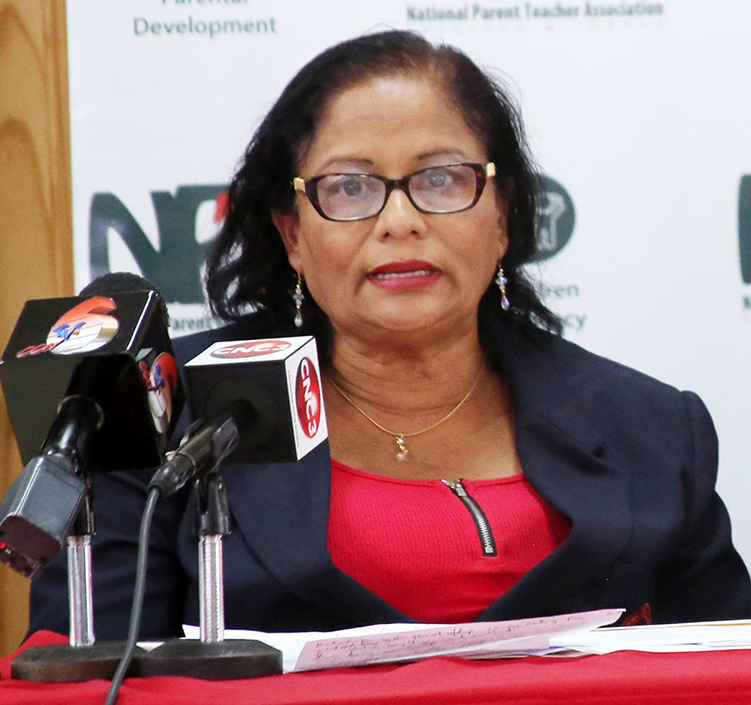(Trinidad Guardian) Shocking statistics were revealed yesterday that three primary school pupils were among 169 school children who became pregnant in the last five years.
And police cannot prosecute offenders as the girls were reluctant or cannot identify the fathers of their babies.
According to Raffiena Ali-Boodoosingh, the president of the National Parent Teachers Association, some 169 school children became pregnant between 2014 and March 2019.
She provided the information yesterday before a meeting of the Joint Select Committee (Social Services and Public Administration) which is conducting an inquiry into the prevalence of teenage pregnancy.
“Allow me to present teenage pregnancy cases for the period 2014 to March 2019, which was given to me by the Ministry of Education, and I have it in education districts. We have Caroni – 15…Port-of-Spain and environs – 59; St George East – 31; North Eastern – 25; Victoria – 16; South Eastern – 17; St Patrick – 6 and we had three girls attending primary school on this listing…So you know the expression, children making children is heard in all corners as a factor affecting our societal ills today and we as a serious nation has to take a serious look at teenage pregnancy.”
The JSC also heard from Acting Supt Vena Butler of the T&T Police Service Child Protection Unit that more than 600 cases of teenage pregnancy have been investigated in the last five years.
She said some victims say they cannot identify who got them pregnant.
Butler said since 2015 there have been 606 cases, but she was unable to provide data on the specific age group of the offenders, how many cases involved adult men or was the result of incest.
“We acknowledge at the onset that we have some challenges in the collection of data. We also acknowledge that our data may not be currently disaggregated to be able to provide specific information in all the fields,” she said.
In previous meetings of the JSC, it was made public that there were 3,777 overall teenage pregnancies in this country between 2014 and 2018.
The committee was also told that the issue of teen pregnancy has never been a stand-alone topic for discussion between the Ministry of Education and the NPTA.
“I am shocked to hear that to tell you the truth,” said Independent Senator Paul Richards, the chairman of the Committee.
The Family Planning Association, FPA, also participated in the inquiry and the organisation’s projects manager Ava Rampersad said that young able-bodied people were not the only ones engaging in sexual activity. “There is an alarming offshoot of concerns with differently-abled persons as well with the subject matter.”
As the meeting went along, committee member Ancil Antoine raised the issue of female Venezuelan teenagers.
“A situation that’s supposed to take place on Friday (registration of Venezuelan migrants) where we are going to be dealing with Venezuelans coming to Trinidad and Tobago, have you put anything in place to deal with teenage pregnancies among Venezuelans who will now be residing in Trinidad and Tobago for the next year as the case may be?”
To this question, Dona Da Costa Martinez, FPA Executive Director, replied that since last year her organisation has been working with the UNHCR (United Nations High Commissioner for Refugees) to provide sexual reproductive health services to the Venezuelan population.
The Child Protection Unit has already been dealing with people from Spanish-speaking countries who were victims of sexual offences, the Committee was told.
The principal or the Mary Care Home for Teenage Mothers, Deborah De Rosia then informed the committee that they currently have pregnant Venezuelan teenagers in their care, including “one who just delivered her baby.”
She said the teenagers at the facility were referred by the Children’s Authority of Trinidad and Tobago.
She added that her organisation is open to life, regardless of where the person comes from.
Yesterday’s JSC followed up on a session in April where statistics were provided that shed light on the problem of teenage pregnancy, including that every month at least 62 teenage girls between the ages of 13 to 19 are reported as pregnant.
JSC members were perplexed as to who the fathers are since that information was lacking. Director of Child Affairs in the Children’s Authority, Safiyah Noel admitted that such information often remained a mystery and in some cases, the fathers are from the community or the home.
Officials also lamented the level of under-reporting as many girls may abort their pregnancies and others lie to health officials about their actual age. They said that in addition to pregnancies, risky teen sexual activity is another major worry.

